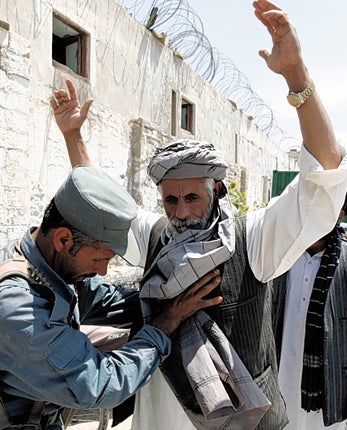Troops face 'most important' battle yet in Afghanistan

Your support helps us to tell the story
From reproductive rights to climate change to Big Tech, The Independent is on the ground when the story is developing. Whether it's investigating the financials of Elon Musk's pro-Trump PAC or producing our latest documentary, 'The A Word', which shines a light on the American women fighting for reproductive rights, we know how important it is to parse out the facts from the messaging.
At such a critical moment in US history, we need reporters on the ground. Your donation allows us to keep sending journalists to speak to both sides of the story.
The Independent is trusted by Americans across the entire political spectrum. And unlike many other quality news outlets, we choose not to lock Americans out of our reporting and analysis with paywalls. We believe quality journalism should be available to everyone, paid for by those who can afford it.
Your support makes all the difference.Kandahar, the birthplace of the Taliban, is to be the target of what Nato commanders are calling the "most difficult and the most important" operation to be carried out by Western forces in Afghanistan since the start of the war there nine years ago.
Torn apart by violence, under the influence of the local strongman, who happens to be the brother of President Hamid Karzai, and at the mercy of militias and the mercenaries of Western security companies, the region is now seen as the key to a military exit strategy drawn up by the US. But the planned offensive has upset many local leaders who have spoken of their alarm at the prospect of prolonged and severe violence.
Mr Karzai promised local elders recently that no military action would take place without their approval. Western officials insist that he subsequently authorised the mission, although this is disputed by the Afghan ruler's office.
Major General Nick Carter, the British commander in charge of 70,000 Nato troops in southern Afghanistan, said yesterday that the hope was to carry out the mission, codenamed Operation Hamkari – Dari for "coalition"– with as little bloodshed as possible.
He described Ahmad Wali Karzai, the President's younger brother who has been accused in US official documents of being a drug trafficker, as a "much maligned figure" who could play a positive role in the future.
Maj-Gen Carter said it was imperative that security is established in Kandahar, where an incendiary situation has developed and the authority of the governor and mayor has been reduced to "pitiable" levels. He said a nexus of unregulated armed groups and madrasahs – Muslim religious schools, many under fundamentalist influences – was mushrooming.
No tally is kept of the large numbers of weapons in circulation. And private security companies, "creations of Western countries", have drawn on local armed men who are acting "with impunity", Maj-Gen Carter said. "What you have is lawlessness, criminality and a culture of impunity where warlords and power brokers are able to rob what they want from the government, take land that is not theirs, and run militias purporting to be private security companies... This is all compounded by what I would only describe as pitifully weak real governance.
"I am in no doubt that what will happen in Kandahar during the course of the next six months will be of massive significance to the campaign," Maj-Gen Carter continued. "Whether it will be decisive or not is for others to judge at other levels. My sense is that Kandahar, as probably the culturally most significant place in terms of the Pashtun people of Afghanistan, is something that needs to be fixed."
Ahmad Wali Karzai is widely seen in Kandahar as a powerful figure who instils fear even among public figures, including Afghan army commanders. His name, according to American sources, was put on Nato's "kill or capture list" by a senior US officer, leading to outrage from the President.
Maj-Gen Carter said he was unaware of any such action and insisted that Ahmad Wali Karzai was "in many ways a positive influence... My sense is that he is either a candidate for an Oscar or that he is the most maligned man in Afghanistan".
However, he acknowledged that the provincial council, which the President runs, has "much more governance than perhaps it is mandated to do through the Afghan constitution", and there should be a readjustment of the balance of power.
Join our commenting forum
Join thought-provoking conversations, follow other Independent readers and see their replies
Comments